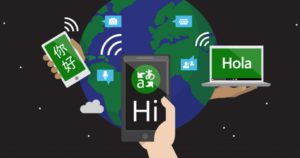The debate of Artificial Intelligence taking over Human work has been quite relevant of late. The immense growth of technology has led to various companies trusting automated software more than human labor.
Multinational companies rely on growth and business in various countries. The need for content translation and localization becomes an integral factor of the system. Machine translation has evolved over the years and it is cheaper and faster compared to Human translators. Human translators, on the other hand, provide better translations. The article discusses both standpoints and their effects on business in general.

Why Machine Translation?
Budget forms an essential aspect for companies wanting to expand their business in the overseas market. Machine translation is a cheaper option with respect to human translation and requires less labor. There are predefined through which the content can be screened and translated. The availability of results is faster. Most businesses don’t even require human interaction to translate the text. These applications convert a language in one language to the other and generate the content. Some software incorporates statistical or rule-based methodologies for more accurate translations. In cases where accuracy isn’t that’s important but deadlines are, machine translation is the best option. Machine translations aren’t fully perfect but close enough to increase overseas traffic.
Why human translation?
- Cultural Linguistics: Machines most often don’t understand linguistic phrases or cultural mannerisms. Human translation thereby is one of the best options for these cases. The idioms and tone which might resonate with the audience can be taken care of by the human translator so that it can appeal to them. To establish an emotional connection with the overseas audience, it becomes important to appeal to them with your content. Under such circumstances, human translation works better than machine translation in keeping the content inoffensive.
- Context and Tone: There are various words in every language which spell the same but mean something else altogether. A machine translation might not be able to understand this in most of cases and do a faulty translation. The Human Translation on the other hand, can be altered based on the context and meaning referred to. Similarly, every content has a tone to it, be it formal, casual or persuasive. It is extremely important when translating the content to keep these in mind. These small nuances to engage the audience often pay off when the human translation is preferred over machine translation.
- Up-to-date: Every culture and society have their popular catchphrases and words which keep changing with time. It becomes almost impossible for machines to keep updating their database of words all the time. When translating content from one language to the local dialect, it becomes important to cash in on these terms which the machine translation fails to. The human translators, on the other hand manage to stay updated with the recent trends and provide more engaging content to interact with the audience. This increases the appeal of the customers and addresses their target audience base to increase sales.
Closing Remarks
Machine based translation always leaves a room for error. Hence, the translations are always proofread before final submission. Businesses simply cannot afford to harm customer relations with grammatically incorrect and culturally disconnected content. The impact of the content becomes essential to boost the audience base and the sales of the company in the region. Machine translations inspite of being cheaper and faster, have a lot of scope to improve in.
Localization, a growing trend in global business forms a major asset of each company. Translating and presenting the content and products according to region not only catches the attention but also steers product sales throughout the world. Translation Management Software(TMS) are vastly available in the market which provides a cheap translation of content for global markets. Localization of the content leads to companies being able to reach out to more users and increase their sales.
The eternal battle of Human vs AI may not end so soon but companies are often spoilt for choice when the question of localizing business arises. Depending on the company and their prospects in every region, they entrust either humans or machines to translate their content so that they can appeal to the customers.
